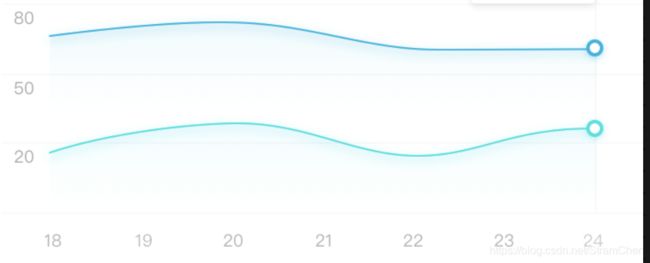MPAndroidChart实现曲线阴影效果
MPAndroidChart实现曲线阴影效果
背景:最近公司项目UI出现一个填充+阴影效果的曲线。效果如图所示。但是发现MPAndroidChart只能实现填充,无法实现阴影的效果。所以fork下来源码阅读了一下,并新增了一个drawShadowColor()方法。
使用方式:
dataSet.setDrawShadow(true);
dataSet.setShadowColor(color);
主要实现方式如下:
1.在 ILineRadarDataSet接口类下新增isDrawShawdowEnabled,getShawdowColor方法:
/**
* Returns true if shadow drawing is enabled, false if not
*
* @return
*/
boolean isDrawShawdowEnabled();
/**
* Returns the color that is used for shadow.
* @return
*/
int getShawdowColor();
2.LineRadarDataSet类下新增两个成员变量 mShadowColor,mDrawShadow以及它们的get,set方法
/**
* the color that is used for filling the line shadow
*/
private int mShadowColor = Color.rgb(0,223,222);
/**
* if true, the data will also be drawn shadow
*/
private boolean mDrawShadow = false;
/**
* Sets the color that is used for filling line shadow.
*
* @param color
*/
public void setShadowColor(int color) {
mShadowColor = color;
}
@Override
public int getShawdowColor() {
return mShadowColor;
}
@Override
public boolean isDrawShawdowEnabled() {
return mDrawShadow;
}
public void setDrawShadow(boolean mDrawShadow) {
this.mDrawShadow = mDrawShadow;
}
3.在LineChartRenderer下的 画圆滑贝塞尔曲线方法 drawCubicBezier 增加一个判断,判断是否需要增加阴影效果,和一个drawShadow方法。
//新增画圆滑曲线
if (dataSet.isDrawShawdowEnabled()) {
cubicFillPath.reset();
cubicFillPath.addPath(cubicPath);
drawShadow(mBitmapCanvas,dataSet,cubicFillPath);
}
插入如下位置:
protected void drawCubicBezier(ILineDataSet dataSet) {
float phaseY = mAnimator.getPhaseY();
Transformer trans = mChart.getTransformer(dataSet.getAxisDependency());
mXBounds.set(mChart, dataSet);
float intensity = dataSet.getCubicIntensity();
cubicPath.reset();
if (mXBounds.range >= 1) {
float prevDx = 0f;
float prevDy = 0f;
float curDx = 0f;
float curDy = 0f;
// Take an extra point from the left, and an extra from the right.
// That's because we need 4 points for a cubic bezier (cubic=4), otherwise we get lines moving and doing weird stuff on the edges of the chart.
// So in the starting `prev` and `cur`, go -2, -1
// And in the `lastIndex`, add +1
final int firstIndex = mXBounds.min + 1;
final int lastIndex = mXBounds.min + mXBounds.range;
Entry prevPrev;
Entry prev = dataSet.getEntryForIndex(Math.max(firstIndex - 2, 0));
Entry cur = dataSet.getEntryForIndex(Math.max(firstIndex - 1, 0));
Entry next = cur;
int nextIndex = -1;
if (cur == null) return;
// let the spline start
cubicPath.moveTo(cur.getX(), cur.getY() * phaseY);
for (int j = mXBounds.min + 1; j <= mXBounds.range + mXBounds.min; j++) {
prevPrev = prev;
prev = cur;
cur = nextIndex == j ? next : dataSet.getEntryForIndex(j);
nextIndex = j + 1 < dataSet.getEntryCount() ? j + 1 : j;
next = dataSet.getEntryForIndex(nextIndex);
prevDx = (cur.getX() - prevPrev.getX()) * intensity;
prevDy = (cur.getY() - prevPrev.getY()) * intensity;
curDx = (next.getX() - prev.getX()) * intensity;
curDy = (next.getY() - prev.getY()) * intensity;
cubicPath.cubicTo(prev.getX() + prevDx, (prev.getY() + prevDy) * phaseY,
cur.getX() - curDx,
(cur.getY() - curDy) * phaseY, cur.getX(), cur.getY() * phaseY);
}
}
// if filled is enabled, close the path
if (dataSet.isDrawFilledEnabled()) {
cubicFillPath.reset();
cubicFillPath.addPath(cubicPath);
drawCubicFill(mBitmapCanvas, dataSet, cubicFillPath, trans, mXBounds);
}
//新增画圆滑曲线
if (dataSet.isDrawShawdowEnabled()) {
cubicFillPath.reset();
cubicFillPath.addPath(cubicPath);
drawShadow(mBitmapCanvas,dataSet,cubicFillPath);
}
mRenderPaint.setColor(dataSet.getColor());
mRenderPaint.setStyle(Paint.Style.STROKE);
trans.pathValueToPixel(cubicPath);
mBitmapCanvas.drawPath(cubicPath, mRenderPaint);
mRenderPaint.setPathEffect(null);
}
增加的drawShadow方法:
protected void drawShadow(Canvas c, ILineDataSet dataSet, Path spline) {
int color = dataSet.getShawdowColor();
mRenderPaint.setShadowLayer(10, 0, 3, color);
c.drawPath(spline, mRenderPaint);
mRenderPaint.setShadowLayer(0, 0, 0, 0);
}
4.至此大功告成。如果要实现填充效果这里就不再赘述。相信大家根据MPAndroidChart提供的demo就能很好的实现。
改动的源码已经上传到github:https://github.com/stramChen/MPAndroidChart-Bezier-shadow
2020.3.19更新:
近期有很多小伙伴联系我,说实现不了上述效果,现在已经将demo上传到github,望能帮助各位小伙伴.
如有疑问请联系邮箱:[email protected]
